Leadership and Management in Unilever: Roles, Theories, and Operations
VerifiedAdded on 2023/01/11
|15
|5848
|75
Report
AI Summary
This report provides a comprehensive analysis of leadership and management within Unilever, a major multinational consumer goods company. It begins by defining and comparing the roles and characteristics of leaders and managers, emphasizing their distinct responsibilities and approaches. The report then examines the application of leadership and management in different situational contexts, such as crisis management and major product launches, illustrating how leaders and managers adapt their strategies to achieve organizational objectives. It further explores various leadership theories and models, including situational leadership, system leadership, and contingency approaches. The report also explains key approaches to operations management and the roles that leaders and managers play in achieving business objectives. Finally, it assesses the impact of factors within the business environment on operational management and decision-making by leaders and managers, culminating in a discussion of how these elements contribute to Unilever's overall success. The report draws on real-world examples and case studies to provide a practical understanding of the subject matter.
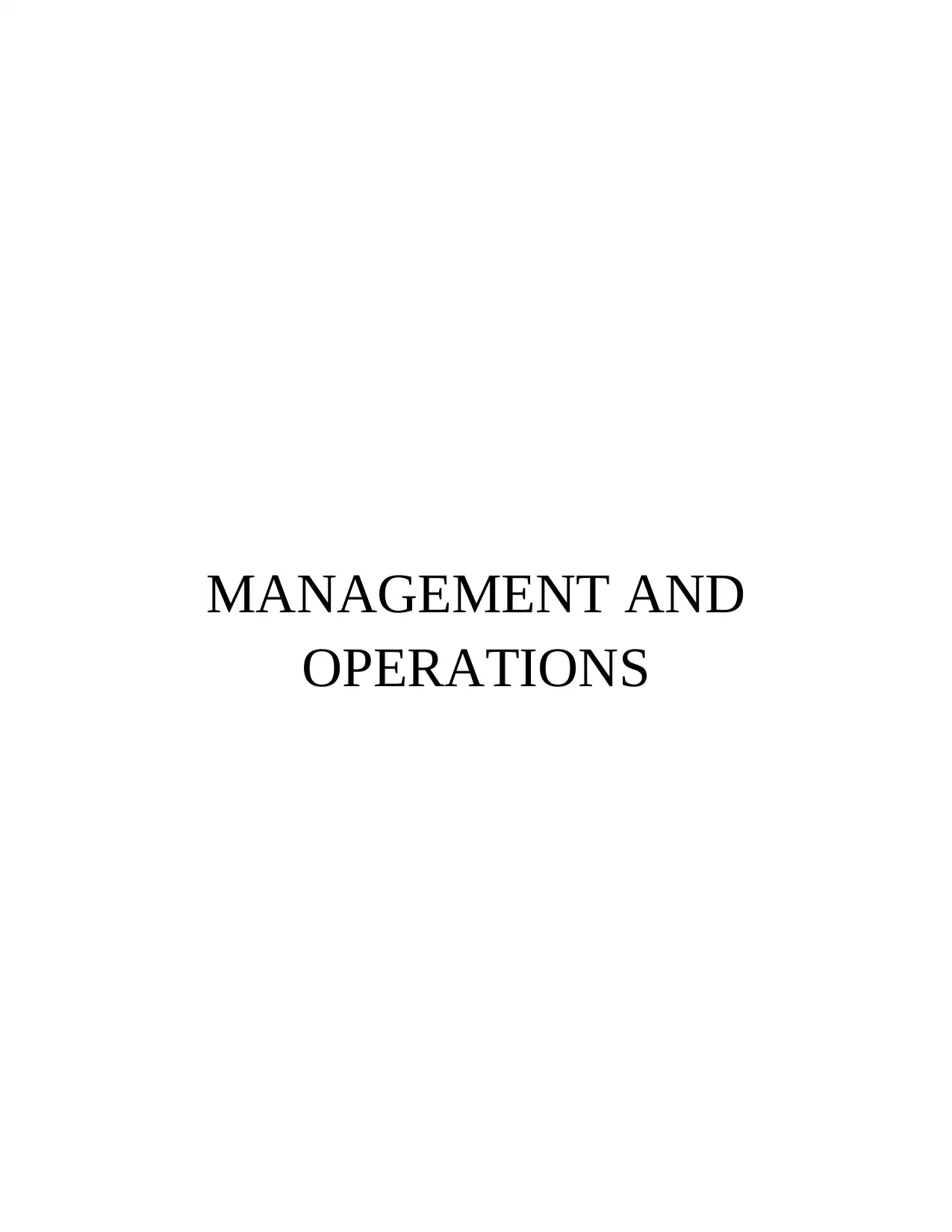
MANAGEMENT AND
OPERATIONS
OPERATIONS
Paraphrase This Document
Need a fresh take? Get an instant paraphrase of this document with our AI Paraphraser
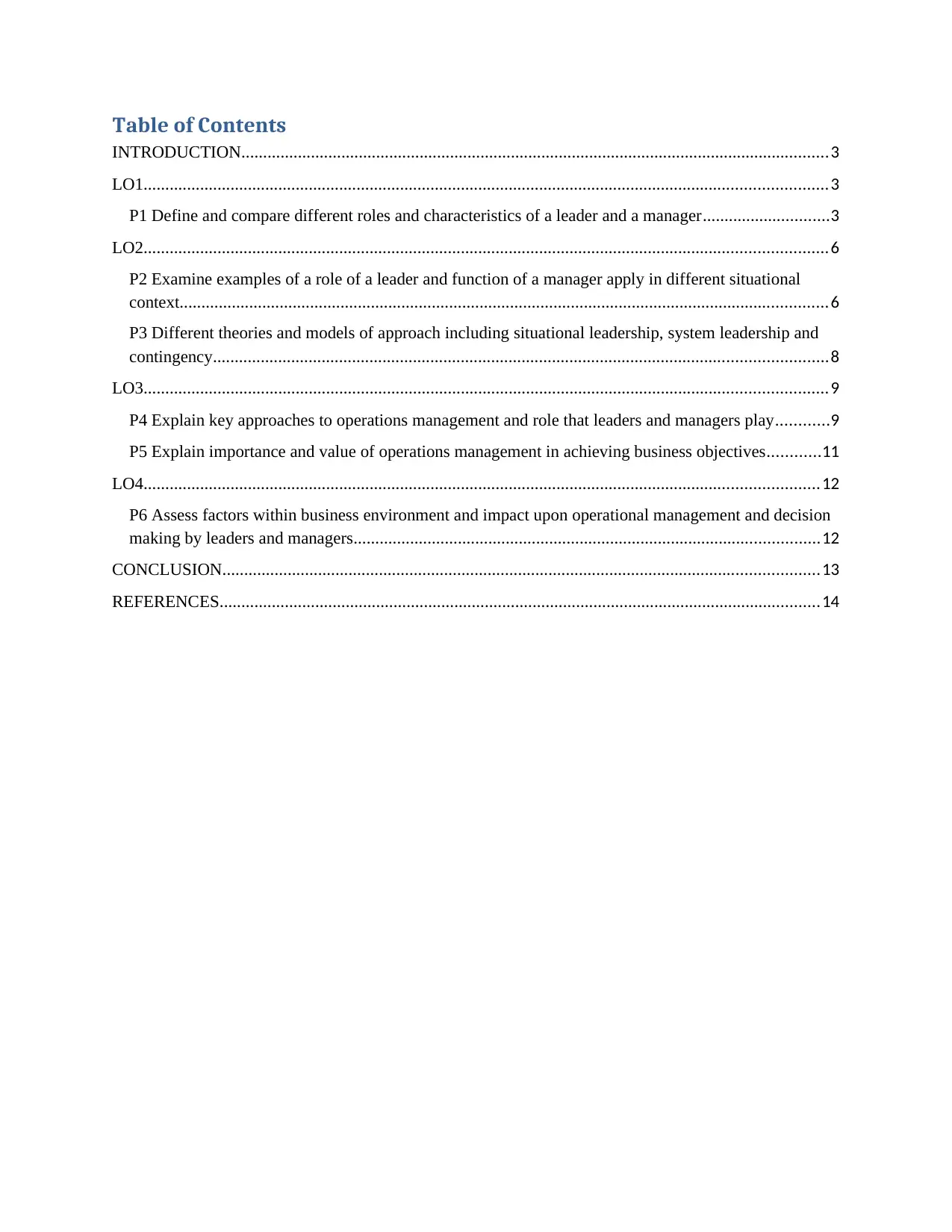
Table of Contents
INTRODUCTION.......................................................................................................................................3
LO1.............................................................................................................................................................3
P1 Define and compare different roles and characteristics of a leader and a manager.............................3
LO2.............................................................................................................................................................6
P2 Examine examples of a role of a leader and function of a manager apply in different situational
context.....................................................................................................................................................6
P3 Different theories and models of approach including situational leadership, system leadership and
contingency.............................................................................................................................................8
LO3.............................................................................................................................................................9
P4 Explain key approaches to operations management and role that leaders and managers play............9
P5 Explain importance and value of operations management in achieving business objectives............11
LO4...........................................................................................................................................................12
P6 Assess factors within business environment and impact upon operational management and decision
making by leaders and managers...........................................................................................................12
CONCLUSION.........................................................................................................................................13
REFERENCES..........................................................................................................................................14
INTRODUCTION.......................................................................................................................................3
LO1.............................................................................................................................................................3
P1 Define and compare different roles and characteristics of a leader and a manager.............................3
LO2.............................................................................................................................................................6
P2 Examine examples of a role of a leader and function of a manager apply in different situational
context.....................................................................................................................................................6
P3 Different theories and models of approach including situational leadership, system leadership and
contingency.............................................................................................................................................8
LO3.............................................................................................................................................................9
P4 Explain key approaches to operations management and role that leaders and managers play............9
P5 Explain importance and value of operations management in achieving business objectives............11
LO4...........................................................................................................................................................12
P6 Assess factors within business environment and impact upon operational management and decision
making by leaders and managers...........................................................................................................12
CONCLUSION.........................................................................................................................................13
REFERENCES..........................................................................................................................................14
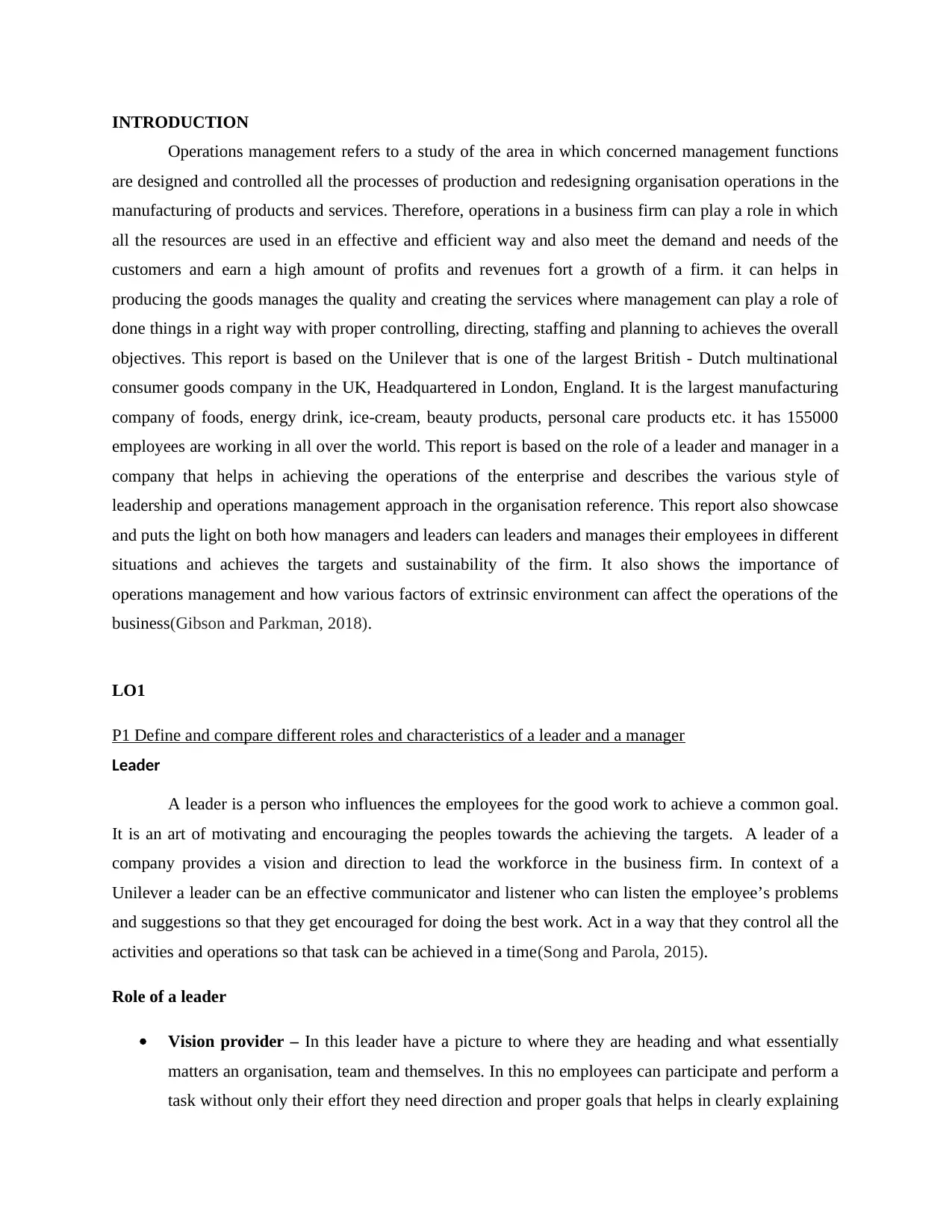
INTRODUCTION
Operations management refers to a study of the area in which concerned management functions
are designed and controlled all the processes of production and redesigning organisation operations in the
manufacturing of products and services. Therefore, operations in a business firm can play a role in which
all the resources are used in an effective and efficient way and also meet the demand and needs of the
customers and earn a high amount of profits and revenues fort a growth of a firm. it can helps in
producing the goods manages the quality and creating the services where management can play a role of
done things in a right way with proper controlling, directing, staffing and planning to achieves the overall
objectives. This report is based on the Unilever that is one of the largest British - Dutch multinational
consumer goods company in the UK, Headquartered in London, England. It is the largest manufacturing
company of foods, energy drink, ice-cream, beauty products, personal care products etc. it has 155000
employees are working in all over the world. This report is based on the role of a leader and manager in a
company that helps in achieving the operations of the enterprise and describes the various style of
leadership and operations management approach in the organisation reference. This report also showcase
and puts the light on both how managers and leaders can leaders and manages their employees in different
situations and achieves the targets and sustainability of the firm. It also shows the importance of
operations management and how various factors of extrinsic environment can affect the operations of the
business(Gibson and Parkman, 2018).
LO1
P1 Define and compare different roles and characteristics of a leader and a manager
Leader
A leader is a person who influences the employees for the good work to achieve a common goal.
It is an art of motivating and encouraging the peoples towards the achieving the targets. A leader of a
company provides a vision and direction to lead the workforce in the business firm. In context of a
Unilever a leader can be an effective communicator and listener who can listen the employee’s problems
and suggestions so that they get encouraged for doing the best work. Act in a way that they control all the
activities and operations so that task can be achieved in a time(Song and Parola, 2015).
Role of a leader
Vision provider – In this leader have a picture to where they are heading and what essentially
matters an organisation, team and themselves. In this no employees can participate and perform a
task without only their effort they need direction and proper goals that helps in clearly explaining
Operations management refers to a study of the area in which concerned management functions
are designed and controlled all the processes of production and redesigning organisation operations in the
manufacturing of products and services. Therefore, operations in a business firm can play a role in which
all the resources are used in an effective and efficient way and also meet the demand and needs of the
customers and earn a high amount of profits and revenues fort a growth of a firm. it can helps in
producing the goods manages the quality and creating the services where management can play a role of
done things in a right way with proper controlling, directing, staffing and planning to achieves the overall
objectives. This report is based on the Unilever that is one of the largest British - Dutch multinational
consumer goods company in the UK, Headquartered in London, England. It is the largest manufacturing
company of foods, energy drink, ice-cream, beauty products, personal care products etc. it has 155000
employees are working in all over the world. This report is based on the role of a leader and manager in a
company that helps in achieving the operations of the enterprise and describes the various style of
leadership and operations management approach in the organisation reference. This report also showcase
and puts the light on both how managers and leaders can leaders and manages their employees in different
situations and achieves the targets and sustainability of the firm. It also shows the importance of
operations management and how various factors of extrinsic environment can affect the operations of the
business(Gibson and Parkman, 2018).
LO1
P1 Define and compare different roles and characteristics of a leader and a manager
Leader
A leader is a person who influences the employees for the good work to achieve a common goal.
It is an art of motivating and encouraging the peoples towards the achieving the targets. A leader of a
company provides a vision and direction to lead the workforce in the business firm. In context of a
Unilever a leader can be an effective communicator and listener who can listen the employee’s problems
and suggestions so that they get encouraged for doing the best work. Act in a way that they control all the
activities and operations so that task can be achieved in a time(Song and Parola, 2015).
Role of a leader
Vision provider – In this leader have a picture to where they are heading and what essentially
matters an organisation, team and themselves. In this no employees can participate and perform a
task without only their effort they need direction and proper goals that helps in clearly explaining
⊘ This is a preview!⊘
Do you want full access?
Subscribe today to unlock all pages.

Trusted by 1+ million students worldwide
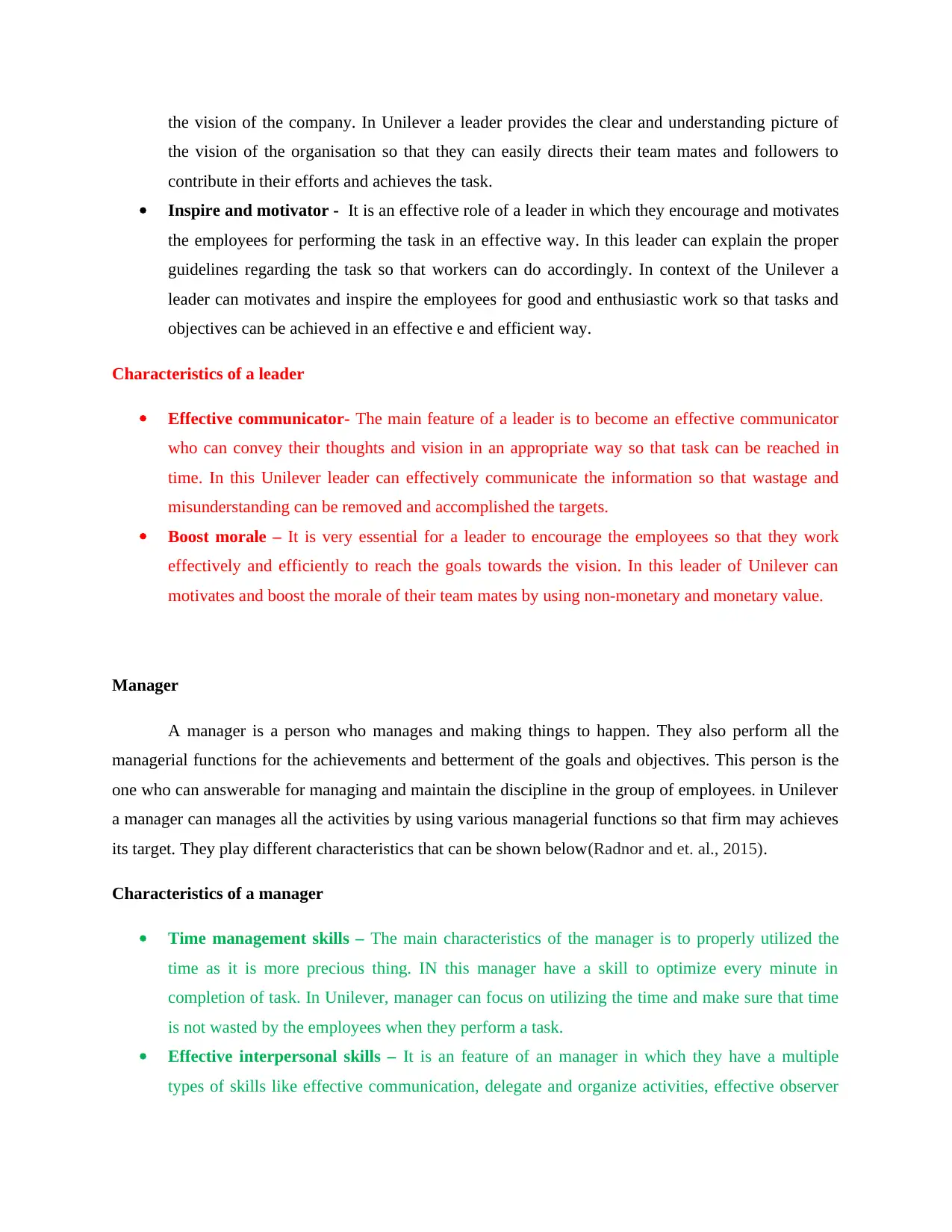
the vision of the company. In Unilever a leader provides the clear and understanding picture of
the vision of the organisation so that they can easily directs their team mates and followers to
contribute in their efforts and achieves the task.
Inspire and motivator - It is an effective role of a leader in which they encourage and motivates
the employees for performing the task in an effective way. In this leader can explain the proper
guidelines regarding the task so that workers can do accordingly. In context of the Unilever a
leader can motivates and inspire the employees for good and enthusiastic work so that tasks and
objectives can be achieved in an effective e and efficient way.
Characteristics of a leader
Effective communicator- The main feature of a leader is to become an effective communicator
who can convey their thoughts and vision in an appropriate way so that task can be reached in
time. In this Unilever leader can effectively communicate the information so that wastage and
misunderstanding can be removed and accomplished the targets.
Boost morale – It is very essential for a leader to encourage the employees so that they work
effectively and efficiently to reach the goals towards the vision. In this leader of Unilever can
motivates and boost the morale of their team mates by using non-monetary and monetary value.
Manager
A manager is a person who manages and making things to happen. They also perform all the
managerial functions for the achievements and betterment of the goals and objectives. This person is the
one who can answerable for managing and maintain the discipline in the group of employees. in Unilever
a manager can manages all the activities by using various managerial functions so that firm may achieves
its target. They play different characteristics that can be shown below(Radnor and et. al., 2015).
Characteristics of a manager
Time management skills – The main characteristics of the manager is to properly utilized the
time as it is more precious thing. IN this manager have a skill to optimize every minute in
completion of task. In Unilever, manager can focus on utilizing the time and make sure that time
is not wasted by the employees when they perform a task.
Effective interpersonal skills – It is an feature of an manager in which they have a multiple
types of skills like effective communication, delegate and organize activities, effective observer
the vision of the organisation so that they can easily directs their team mates and followers to
contribute in their efforts and achieves the task.
Inspire and motivator - It is an effective role of a leader in which they encourage and motivates
the employees for performing the task in an effective way. In this leader can explain the proper
guidelines regarding the task so that workers can do accordingly. In context of the Unilever a
leader can motivates and inspire the employees for good and enthusiastic work so that tasks and
objectives can be achieved in an effective e and efficient way.
Characteristics of a leader
Effective communicator- The main feature of a leader is to become an effective communicator
who can convey their thoughts and vision in an appropriate way so that task can be reached in
time. In this Unilever leader can effectively communicate the information so that wastage and
misunderstanding can be removed and accomplished the targets.
Boost morale – It is very essential for a leader to encourage the employees so that they work
effectively and efficiently to reach the goals towards the vision. In this leader of Unilever can
motivates and boost the morale of their team mates by using non-monetary and monetary value.
Manager
A manager is a person who manages and making things to happen. They also perform all the
managerial functions for the achievements and betterment of the goals and objectives. This person is the
one who can answerable for managing and maintain the discipline in the group of employees. in Unilever
a manager can manages all the activities by using various managerial functions so that firm may achieves
its target. They play different characteristics that can be shown below(Radnor and et. al., 2015).
Characteristics of a manager
Time management skills – The main characteristics of the manager is to properly utilized the
time as it is more precious thing. IN this manager have a skill to optimize every minute in
completion of task. In Unilever, manager can focus on utilizing the time and make sure that time
is not wasted by the employees when they perform a task.
Effective interpersonal skills – It is an feature of an manager in which they have a multiple
types of skills like effective communication, delegate and organize activities, effective observer
Paraphrase This Document
Need a fresh take? Get an instant paraphrase of this document with our AI Paraphraser
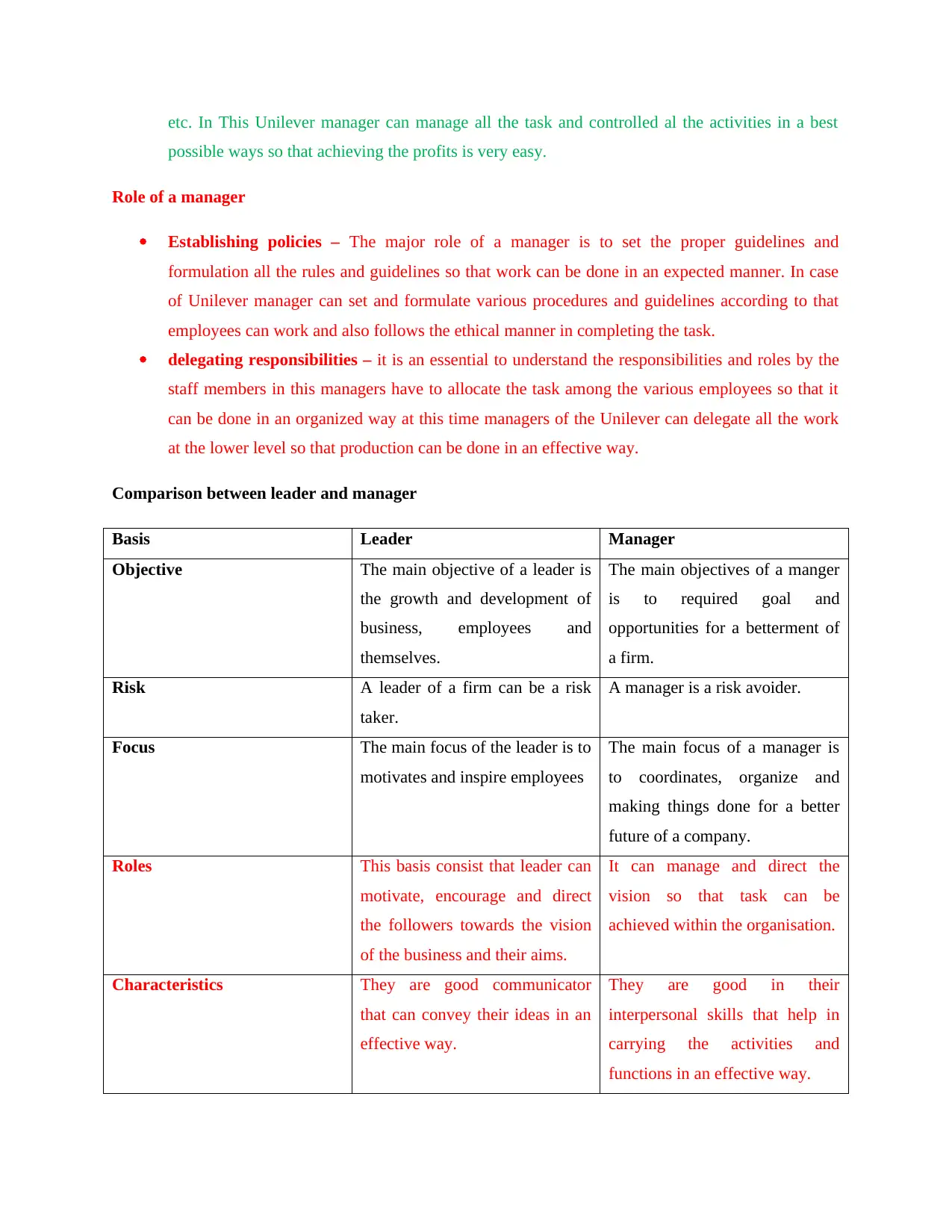
etc. In This Unilever manager can manage all the task and controlled al the activities in a best
possible ways so that achieving the profits is very easy.
Role of a manager
Establishing policies – The major role of a manager is to set the proper guidelines and
formulation all the rules and guidelines so that work can be done in an expected manner. In case
of Unilever manager can set and formulate various procedures and guidelines according to that
employees can work and also follows the ethical manner in completing the task.
delegating responsibilities – it is an essential to understand the responsibilities and roles by the
staff members in this managers have to allocate the task among the various employees so that it
can be done in an organized way at this time managers of the Unilever can delegate all the work
at the lower level so that production can be done in an effective way.
Comparison between leader and manager
Basis Leader Manager
Objective The main objective of a leader is
the growth and development of
business, employees and
themselves.
The main objectives of a manger
is to required goal and
opportunities for a betterment of
a firm.
Risk A leader of a firm can be a risk
taker.
A manager is a risk avoider.
Focus The main focus of the leader is to
motivates and inspire employees
The main focus of a manager is
to coordinates, organize and
making things done for a better
future of a company.
Roles This basis consist that leader can
motivate, encourage and direct
the followers towards the vision
of the business and their aims.
It can manage and direct the
vision so that task can be
achieved within the organisation.
Characteristics They are good communicator
that can convey their ideas in an
effective way.
They are good in their
interpersonal skills that help in
carrying the activities and
functions in an effective way.
possible ways so that achieving the profits is very easy.
Role of a manager
Establishing policies – The major role of a manager is to set the proper guidelines and
formulation all the rules and guidelines so that work can be done in an expected manner. In case
of Unilever manager can set and formulate various procedures and guidelines according to that
employees can work and also follows the ethical manner in completing the task.
delegating responsibilities – it is an essential to understand the responsibilities and roles by the
staff members in this managers have to allocate the task among the various employees so that it
can be done in an organized way at this time managers of the Unilever can delegate all the work
at the lower level so that production can be done in an effective way.
Comparison between leader and manager
Basis Leader Manager
Objective The main objective of a leader is
the growth and development of
business, employees and
themselves.
The main objectives of a manger
is to required goal and
opportunities for a betterment of
a firm.
Risk A leader of a firm can be a risk
taker.
A manager is a risk avoider.
Focus The main focus of the leader is to
motivates and inspire employees
The main focus of a manager is
to coordinates, organize and
making things done for a better
future of a company.
Roles This basis consist that leader can
motivate, encourage and direct
the followers towards the vision
of the business and their aims.
It can manage and direct the
vision so that task can be
achieved within the organisation.
Characteristics They are good communicator
that can convey their ideas in an
effective way.
They are good in their
interpersonal skills that help in
carrying the activities and
functions in an effective way.
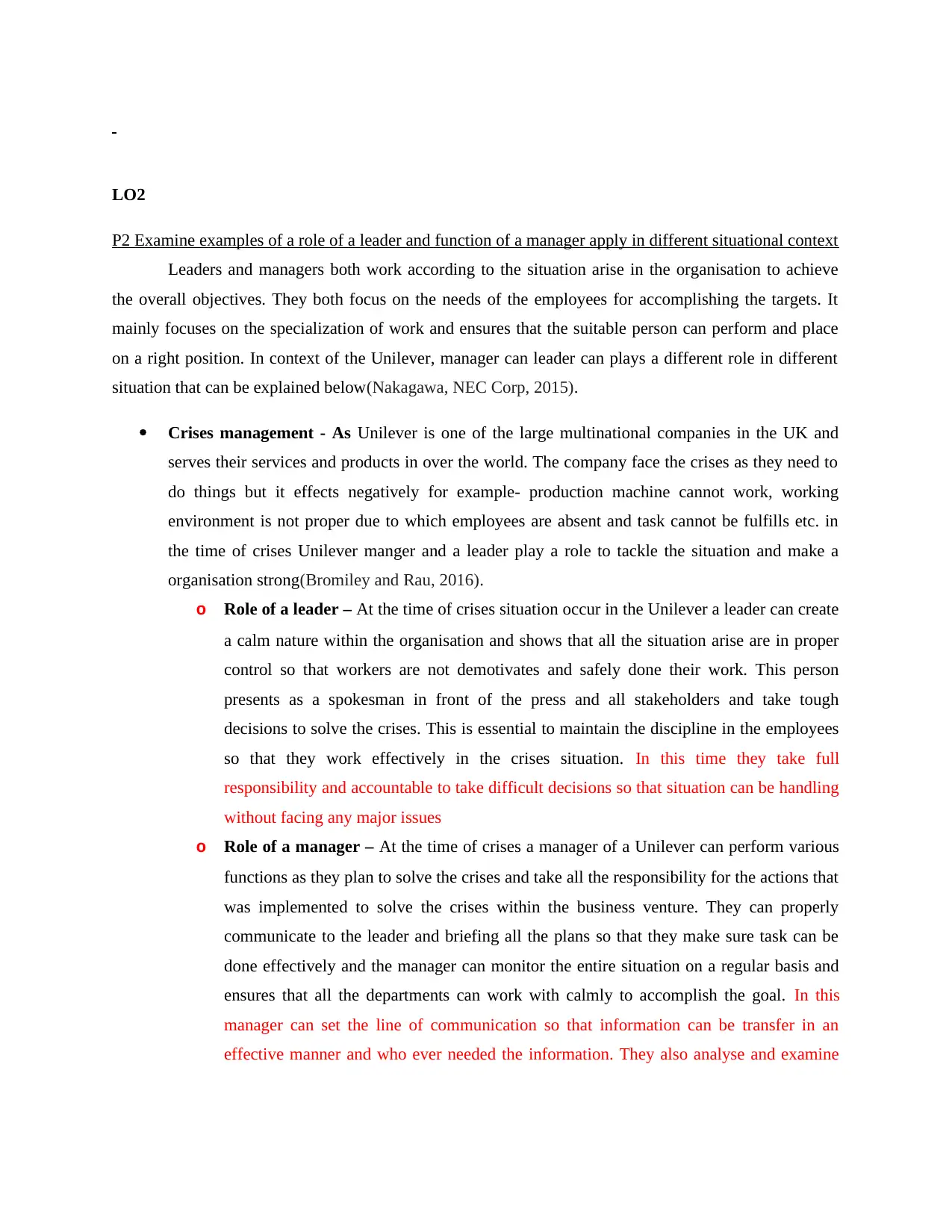
LO2
P2 Examine examples of a role of a leader and function of a manager apply in different situational context
Leaders and managers both work according to the situation arise in the organisation to achieve
the overall objectives. They both focus on the needs of the employees for accomplishing the targets. It
mainly focuses on the specialization of work and ensures that the suitable person can perform and place
on a right position. In context of the Unilever, manager can leader can plays a different role in different
situation that can be explained below(Nakagawa, NEC Corp, 2015).
Crises management - As Unilever is one of the large multinational companies in the UK and
serves their services and products in over the world. The company face the crises as they need to
do things but it effects negatively for example- production machine cannot work, working
environment is not proper due to which employees are absent and task cannot be fulfills etc. in
the time of crises Unilever manger and a leader play a role to tackle the situation and make a
organisation strong(Bromiley and Rau, 2016).
o Role of a leader – At the time of crises situation occur in the Unilever a leader can create
a calm nature within the organisation and shows that all the situation arise are in proper
control so that workers are not demotivates and safely done their work. This person
presents as a spokesman in front of the press and all stakeholders and take tough
decisions to solve the crises. This is essential to maintain the discipline in the employees
so that they work effectively in the crises situation. In this time they take full
responsibility and accountable to take difficult decisions so that situation can be handling
without facing any major issues
o Role of a manager – At the time of crises a manager of a Unilever can perform various
functions as they plan to solve the crises and take all the responsibility for the actions that
was implemented to solve the crises within the business venture. They can properly
communicate to the leader and briefing all the plans so that they make sure task can be
done effectively and the manager can monitor the entire situation on a regular basis and
ensures that all the departments can work with calmly to accomplish the goal. In this
manager can set the line of communication so that information can be transfer in an
effective manner and who ever needed the information. They also analyse and examine
P2 Examine examples of a role of a leader and function of a manager apply in different situational context
Leaders and managers both work according to the situation arise in the organisation to achieve
the overall objectives. They both focus on the needs of the employees for accomplishing the targets. It
mainly focuses on the specialization of work and ensures that the suitable person can perform and place
on a right position. In context of the Unilever, manager can leader can plays a different role in different
situation that can be explained below(Nakagawa, NEC Corp, 2015).
Crises management - As Unilever is one of the large multinational companies in the UK and
serves their services and products in over the world. The company face the crises as they need to
do things but it effects negatively for example- production machine cannot work, working
environment is not proper due to which employees are absent and task cannot be fulfills etc. in
the time of crises Unilever manger and a leader play a role to tackle the situation and make a
organisation strong(Bromiley and Rau, 2016).
o Role of a leader – At the time of crises situation occur in the Unilever a leader can create
a calm nature within the organisation and shows that all the situation arise are in proper
control so that workers are not demotivates and safely done their work. This person
presents as a spokesman in front of the press and all stakeholders and take tough
decisions to solve the crises. This is essential to maintain the discipline in the employees
so that they work effectively in the crises situation. In this time they take full
responsibility and accountable to take difficult decisions so that situation can be handling
without facing any major issues
o Role of a manager – At the time of crises a manager of a Unilever can perform various
functions as they plan to solve the crises and take all the responsibility for the actions that
was implemented to solve the crises within the business venture. They can properly
communicate to the leader and briefing all the plans so that they make sure task can be
done effectively and the manager can monitor the entire situation on a regular basis and
ensures that all the departments can work with calmly to accomplish the goal. In this
manager can set the line of communication so that information can be transfer in an
effective manner and who ever needed the information. They also analyse and examine
⊘ This is a preview!⊘
Do you want full access?
Subscribe today to unlock all pages.

Trusted by 1+ million students worldwide
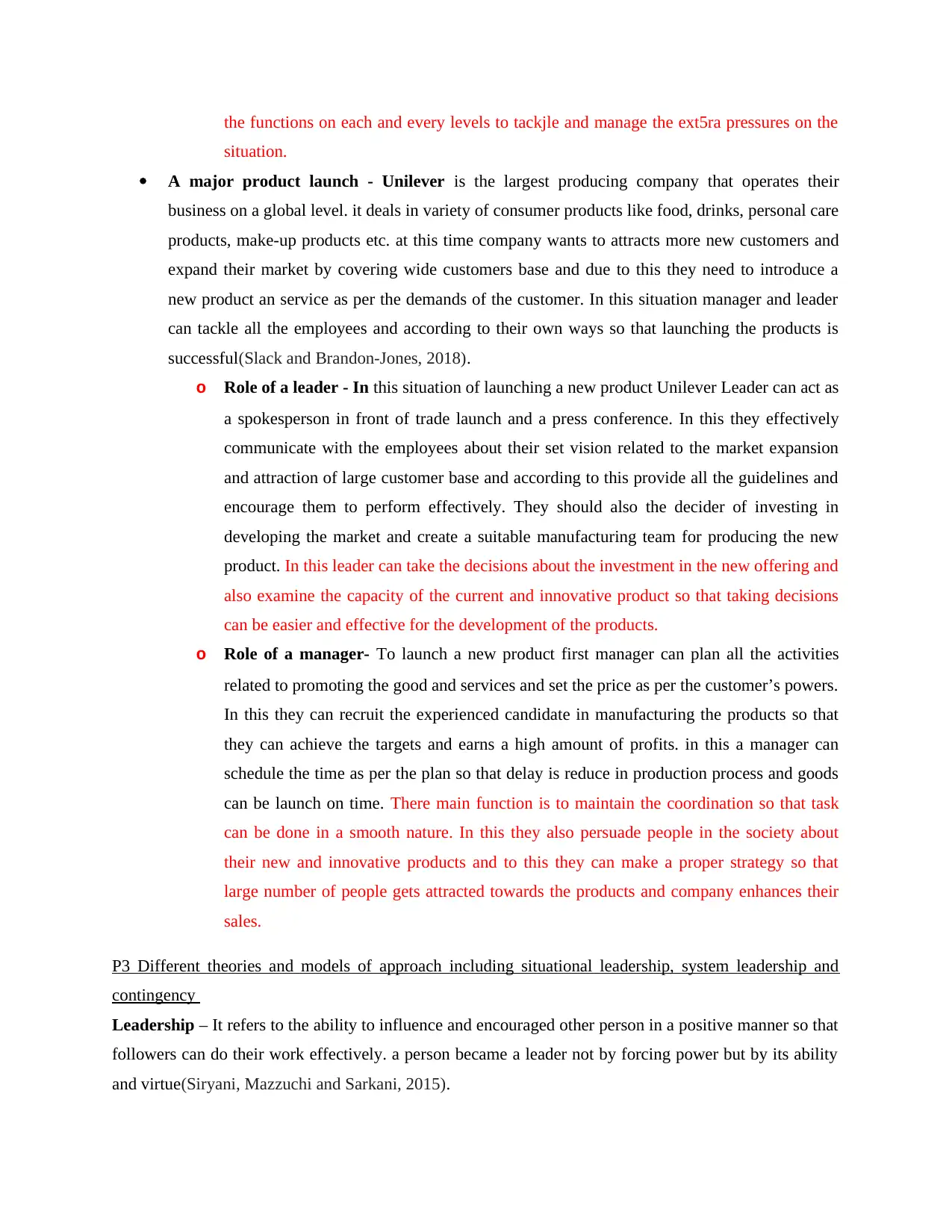
the functions on each and every levels to tackjle and manage the ext5ra pressures on the
situation.
A major product launch - Unilever is the largest producing company that operates their
business on a global level. it deals in variety of consumer products like food, drinks, personal care
products, make-up products etc. at this time company wants to attracts more new customers and
expand their market by covering wide customers base and due to this they need to introduce a
new product an service as per the demands of the customer. In this situation manager and leader
can tackle all the employees and according to their own ways so that launching the products is
successful(Slack and Brandon-Jones, 2018).
o Role of a leader - In this situation of launching a new product Unilever Leader can act as
a spokesperson in front of trade launch and a press conference. In this they effectively
communicate with the employees about their set vision related to the market expansion
and attraction of large customer base and according to this provide all the guidelines and
encourage them to perform effectively. They should also the decider of investing in
developing the market and create a suitable manufacturing team for producing the new
product. In this leader can take the decisions about the investment in the new offering and
also examine the capacity of the current and innovative product so that taking decisions
can be easier and effective for the development of the products.
o Role of a manager- To launch a new product first manager can plan all the activities
related to promoting the good and services and set the price as per the customer’s powers.
In this they can recruit the experienced candidate in manufacturing the products so that
they can achieve the targets and earns a high amount of profits. in this a manager can
schedule the time as per the plan so that delay is reduce in production process and goods
can be launch on time. There main function is to maintain the coordination so that task
can be done in a smooth nature. In this they also persuade people in the society about
their new and innovative products and to this they can make a proper strategy so that
large number of people gets attracted towards the products and company enhances their
sales.
P3 Different theories and models of approach including situational leadership, system leadership and
contingency
Leadership – It refers to the ability to influence and encouraged other person in a positive manner so that
followers can do their work effectively. a person became a leader not by forcing power but by its ability
and virtue(Siryani, Mazzuchi and Sarkani, 2015).
situation.
A major product launch - Unilever is the largest producing company that operates their
business on a global level. it deals in variety of consumer products like food, drinks, personal care
products, make-up products etc. at this time company wants to attracts more new customers and
expand their market by covering wide customers base and due to this they need to introduce a
new product an service as per the demands of the customer. In this situation manager and leader
can tackle all the employees and according to their own ways so that launching the products is
successful(Slack and Brandon-Jones, 2018).
o Role of a leader - In this situation of launching a new product Unilever Leader can act as
a spokesperson in front of trade launch and a press conference. In this they effectively
communicate with the employees about their set vision related to the market expansion
and attraction of large customer base and according to this provide all the guidelines and
encourage them to perform effectively. They should also the decider of investing in
developing the market and create a suitable manufacturing team for producing the new
product. In this leader can take the decisions about the investment in the new offering and
also examine the capacity of the current and innovative product so that taking decisions
can be easier and effective for the development of the products.
o Role of a manager- To launch a new product first manager can plan all the activities
related to promoting the good and services and set the price as per the customer’s powers.
In this they can recruit the experienced candidate in manufacturing the products so that
they can achieve the targets and earns a high amount of profits. in this a manager can
schedule the time as per the plan so that delay is reduce in production process and goods
can be launch on time. There main function is to maintain the coordination so that task
can be done in a smooth nature. In this they also persuade people in the society about
their new and innovative products and to this they can make a proper strategy so that
large number of people gets attracted towards the products and company enhances their
sales.
P3 Different theories and models of approach including situational leadership, system leadership and
contingency
Leadership – It refers to the ability to influence and encouraged other person in a positive manner so that
followers can do their work effectively. a person became a leader not by forcing power but by its ability
and virtue(Siryani, Mazzuchi and Sarkani, 2015).
Paraphrase This Document
Need a fresh take? Get an instant paraphrase of this document with our AI Paraphraser
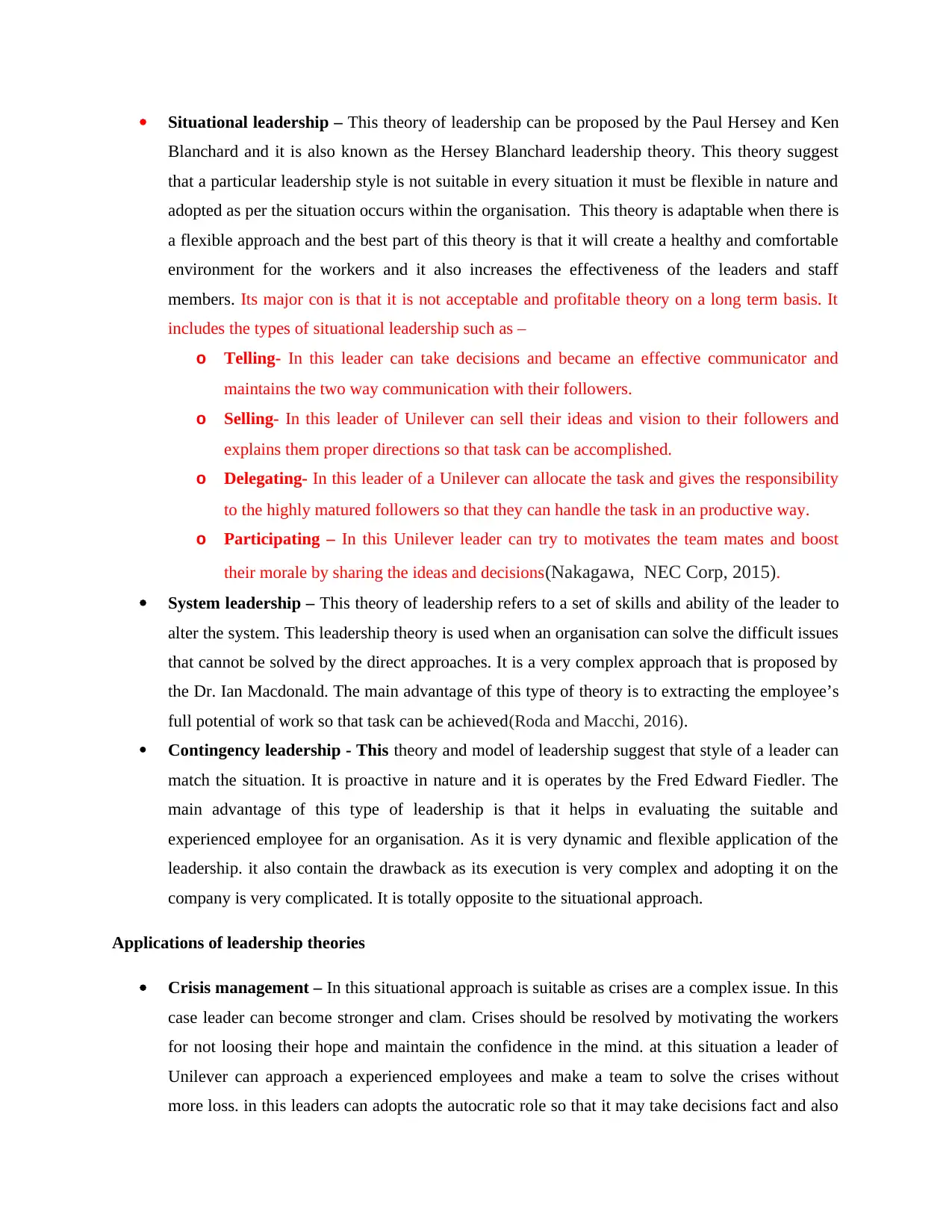
Situational leadership – This theory of leadership can be proposed by the Paul Hersey and Ken
Blanchard and it is also known as the Hersey Blanchard leadership theory. This theory suggest
that a particular leadership style is not suitable in every situation it must be flexible in nature and
adopted as per the situation occurs within the organisation. This theory is adaptable when there is
a flexible approach and the best part of this theory is that it will create a healthy and comfortable
environment for the workers and it also increases the effectiveness of the leaders and staff
members. Its major con is that it is not acceptable and profitable theory on a long term basis. It
includes the types of situational leadership such as –
o Telling- In this leader can take decisions and became an effective communicator and
maintains the two way communication with their followers.
o Selling- In this leader of Unilever can sell their ideas and vision to their followers and
explains them proper directions so that task can be accomplished.
o Delegating- In this leader of a Unilever can allocate the task and gives the responsibility
to the highly matured followers so that they can handle the task in an productive way.
o Participating – In this Unilever leader can try to motivates the team mates and boost
their morale by sharing the ideas and decisions(Nakagawa, NEC Corp, 2015).
System leadership – This theory of leadership refers to a set of skills and ability of the leader to
alter the system. This leadership theory is used when an organisation can solve the difficult issues
that cannot be solved by the direct approaches. It is a very complex approach that is proposed by
the Dr. Ian Macdonald. The main advantage of this type of theory is to extracting the employee’s
full potential of work so that task can be achieved(Roda and Macchi, 2016).
Contingency leadership - This theory and model of leadership suggest that style of a leader can
match the situation. It is proactive in nature and it is operates by the Fred Edward Fiedler. The
main advantage of this type of leadership is that it helps in evaluating the suitable and
experienced employee for an organisation. As it is very dynamic and flexible application of the
leadership. it also contain the drawback as its execution is very complex and adopting it on the
company is very complicated. It is totally opposite to the situational approach.
Applications of leadership theories
Crisis management – In this situational approach is suitable as crises are a complex issue. In this
case leader can become stronger and clam. Crises should be resolved by motivating the workers
for not loosing their hope and maintain the confidence in the mind. at this situation a leader of
Unilever can approach a experienced employees and make a team to solve the crises without
more loss. in this leaders can adopts the autocratic role so that it may take decisions fact and also
Blanchard and it is also known as the Hersey Blanchard leadership theory. This theory suggest
that a particular leadership style is not suitable in every situation it must be flexible in nature and
adopted as per the situation occurs within the organisation. This theory is adaptable when there is
a flexible approach and the best part of this theory is that it will create a healthy and comfortable
environment for the workers and it also increases the effectiveness of the leaders and staff
members. Its major con is that it is not acceptable and profitable theory on a long term basis. It
includes the types of situational leadership such as –
o Telling- In this leader can take decisions and became an effective communicator and
maintains the two way communication with their followers.
o Selling- In this leader of Unilever can sell their ideas and vision to their followers and
explains them proper directions so that task can be accomplished.
o Delegating- In this leader of a Unilever can allocate the task and gives the responsibility
to the highly matured followers so that they can handle the task in an productive way.
o Participating – In this Unilever leader can try to motivates the team mates and boost
their morale by sharing the ideas and decisions(Nakagawa, NEC Corp, 2015).
System leadership – This theory of leadership refers to a set of skills and ability of the leader to
alter the system. This leadership theory is used when an organisation can solve the difficult issues
that cannot be solved by the direct approaches. It is a very complex approach that is proposed by
the Dr. Ian Macdonald. The main advantage of this type of theory is to extracting the employee’s
full potential of work so that task can be achieved(Roda and Macchi, 2016).
Contingency leadership - This theory and model of leadership suggest that style of a leader can
match the situation. It is proactive in nature and it is operates by the Fred Edward Fiedler. The
main advantage of this type of leadership is that it helps in evaluating the suitable and
experienced employee for an organisation. As it is very dynamic and flexible application of the
leadership. it also contain the drawback as its execution is very complex and adopting it on the
company is very complicated. It is totally opposite to the situational approach.
Applications of leadership theories
Crisis management – In this situational approach is suitable as crises are a complex issue. In this
case leader can become stronger and clam. Crises should be resolved by motivating the workers
for not loosing their hope and maintain the confidence in the mind. at this situation a leader of
Unilever can approach a experienced employees and make a team to solve the crises without
more loss. in this leaders can adopts the autocratic role so that it may take decisions fact and also
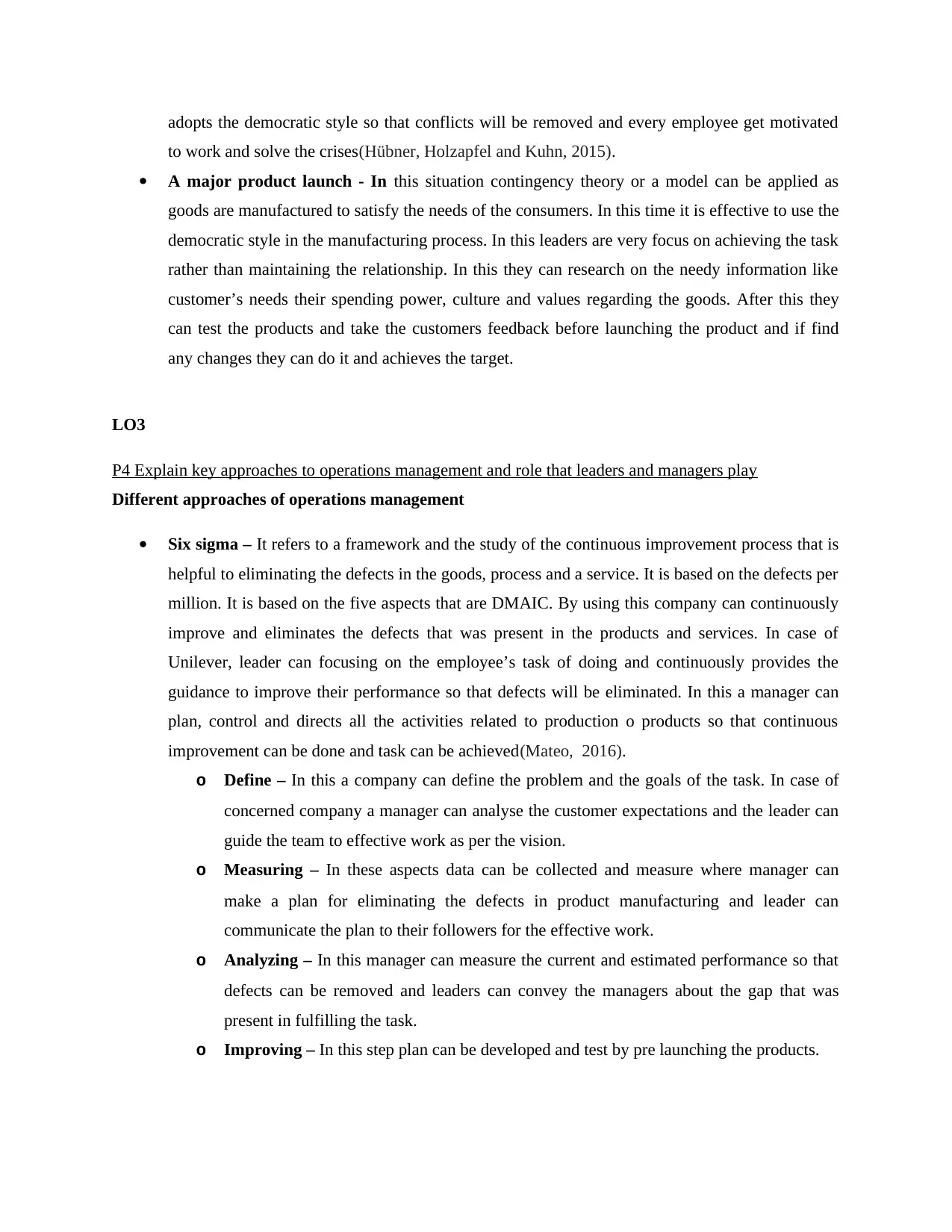
adopts the democratic style so that conflicts will be removed and every employee get motivated
to work and solve the crises(Hübner, Holzapfel and Kuhn, 2015).
A major product launch - In this situation contingency theory or a model can be applied as
goods are manufactured to satisfy the needs of the consumers. In this time it is effective to use the
democratic style in the manufacturing process. In this leaders are very focus on achieving the task
rather than maintaining the relationship. In this they can research on the needy information like
customer’s needs their spending power, culture and values regarding the goods. After this they
can test the products and take the customers feedback before launching the product and if find
any changes they can do it and achieves the target.
LO3
P4 Explain key approaches to operations management and role that leaders and managers play
Different approaches of operations management
Six sigma – It refers to a framework and the study of the continuous improvement process that is
helpful to eliminating the defects in the goods, process and a service. It is based on the defects per
million. It is based on the five aspects that are DMAIC. By using this company can continuously
improve and eliminates the defects that was present in the products and services. In case of
Unilever, leader can focusing on the employee’s task of doing and continuously provides the
guidance to improve their performance so that defects will be eliminated. In this a manager can
plan, control and directs all the activities related to production o products so that continuous
improvement can be done and task can be achieved(Mateo, 2016).
o Define – In this a company can define the problem and the goals of the task. In case of
concerned company a manager can analyse the customer expectations and the leader can
guide the team to effective work as per the vision.
o Measuring – In these aspects data can be collected and measure where manager can
make a plan for eliminating the defects in product manufacturing and leader can
communicate the plan to their followers for the effective work.
o Analyzing – In this manager can measure the current and estimated performance so that
defects can be removed and leaders can convey the managers about the gap that was
present in fulfilling the task.
o Improving – In this step plan can be developed and test by pre launching the products.
to work and solve the crises(Hübner, Holzapfel and Kuhn, 2015).
A major product launch - In this situation contingency theory or a model can be applied as
goods are manufactured to satisfy the needs of the consumers. In this time it is effective to use the
democratic style in the manufacturing process. In this leaders are very focus on achieving the task
rather than maintaining the relationship. In this they can research on the needy information like
customer’s needs their spending power, culture and values regarding the goods. After this they
can test the products and take the customers feedback before launching the product and if find
any changes they can do it and achieves the target.
LO3
P4 Explain key approaches to operations management and role that leaders and managers play
Different approaches of operations management
Six sigma – It refers to a framework and the study of the continuous improvement process that is
helpful to eliminating the defects in the goods, process and a service. It is based on the defects per
million. It is based on the five aspects that are DMAIC. By using this company can continuously
improve and eliminates the defects that was present in the products and services. In case of
Unilever, leader can focusing on the employee’s task of doing and continuously provides the
guidance to improve their performance so that defects will be eliminated. In this a manager can
plan, control and directs all the activities related to production o products so that continuous
improvement can be done and task can be achieved(Mateo, 2016).
o Define – In this a company can define the problem and the goals of the task. In case of
concerned company a manager can analyse the customer expectations and the leader can
guide the team to effective work as per the vision.
o Measuring – In these aspects data can be collected and measure where manager can
make a plan for eliminating the defects in product manufacturing and leader can
communicate the plan to their followers for the effective work.
o Analyzing – In this manager can measure the current and estimated performance so that
defects can be removed and leaders can convey the managers about the gap that was
present in fulfilling the task.
o Improving – In this step plan can be developed and test by pre launching the products.
⊘ This is a preview!⊘
Do you want full access?
Subscribe today to unlock all pages.

Trusted by 1+ million students worldwide
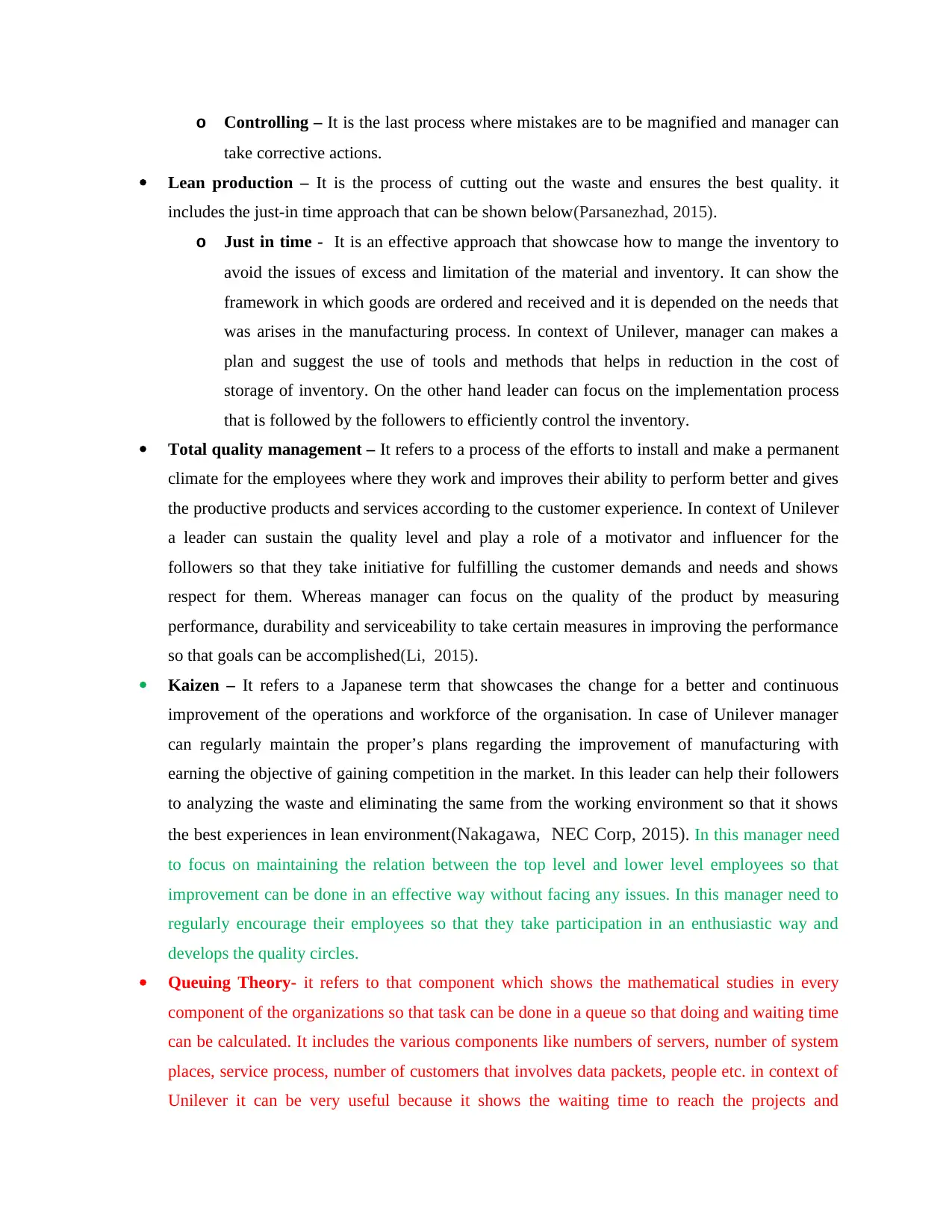
o Controlling – It is the last process where mistakes are to be magnified and manager can
take corrective actions.
Lean production – It is the process of cutting out the waste and ensures the best quality. it
includes the just-in time approach that can be shown below(Parsanezhad, 2015).
o Just in time - It is an effective approach that showcase how to mange the inventory to
avoid the issues of excess and limitation of the material and inventory. It can show the
framework in which goods are ordered and received and it is depended on the needs that
was arises in the manufacturing process. In context of Unilever, manager can makes a
plan and suggest the use of tools and methods that helps in reduction in the cost of
storage of inventory. On the other hand leader can focus on the implementation process
that is followed by the followers to efficiently control the inventory.
Total quality management – It refers to a process of the efforts to install and make a permanent
climate for the employees where they work and improves their ability to perform better and gives
the productive products and services according to the customer experience. In context of Unilever
a leader can sustain the quality level and play a role of a motivator and influencer for the
followers so that they take initiative for fulfilling the customer demands and needs and shows
respect for them. Whereas manager can focus on the quality of the product by measuring
performance, durability and serviceability to take certain measures in improving the performance
so that goals can be accomplished(Li, 2015).
Kaizen – It refers to a Japanese term that showcases the change for a better and continuous
improvement of the operations and workforce of the organisation. In case of Unilever manager
can regularly maintain the proper’s plans regarding the improvement of manufacturing with
earning the objective of gaining competition in the market. In this leader can help their followers
to analyzing the waste and eliminating the same from the working environment so that it shows
the best experiences in lean environment(Nakagawa, NEC Corp, 2015). In this manager need
to focus on maintaining the relation between the top level and lower level employees so that
improvement can be done in an effective way without facing any issues. In this manager need to
regularly encourage their employees so that they take participation in an enthusiastic way and
develops the quality circles.
Queuing Theory- it refers to that component which shows the mathematical studies in every
component of the organizations so that task can be done in a queue so that doing and waiting time
can be calculated. It includes the various components like numbers of servers, number of system
places, service process, number of customers that involves data packets, people etc. in context of
Unilever it can be very useful because it shows the waiting time to reach the projects and
take corrective actions.
Lean production – It is the process of cutting out the waste and ensures the best quality. it
includes the just-in time approach that can be shown below(Parsanezhad, 2015).
o Just in time - It is an effective approach that showcase how to mange the inventory to
avoid the issues of excess and limitation of the material and inventory. It can show the
framework in which goods are ordered and received and it is depended on the needs that
was arises in the manufacturing process. In context of Unilever, manager can makes a
plan and suggest the use of tools and methods that helps in reduction in the cost of
storage of inventory. On the other hand leader can focus on the implementation process
that is followed by the followers to efficiently control the inventory.
Total quality management – It refers to a process of the efforts to install and make a permanent
climate for the employees where they work and improves their ability to perform better and gives
the productive products and services according to the customer experience. In context of Unilever
a leader can sustain the quality level and play a role of a motivator and influencer for the
followers so that they take initiative for fulfilling the customer demands and needs and shows
respect for them. Whereas manager can focus on the quality of the product by measuring
performance, durability and serviceability to take certain measures in improving the performance
so that goals can be accomplished(Li, 2015).
Kaizen – It refers to a Japanese term that showcases the change for a better and continuous
improvement of the operations and workforce of the organisation. In case of Unilever manager
can regularly maintain the proper’s plans regarding the improvement of manufacturing with
earning the objective of gaining competition in the market. In this leader can help their followers
to analyzing the waste and eliminating the same from the working environment so that it shows
the best experiences in lean environment(Nakagawa, NEC Corp, 2015). In this manager need
to focus on maintaining the relation between the top level and lower level employees so that
improvement can be done in an effective way without facing any issues. In this manager need to
regularly encourage their employees so that they take participation in an enthusiastic way and
develops the quality circles.
Queuing Theory- it refers to that component which shows the mathematical studies in every
component of the organizations so that task can be done in a queue so that doing and waiting time
can be calculated. It includes the various components like numbers of servers, number of system
places, service process, number of customers that involves data packets, people etc. in context of
Unilever it can be very useful because it shows the waiting time to reach the projects and
Paraphrase This Document
Need a fresh take? Get an instant paraphrase of this document with our AI Paraphraser
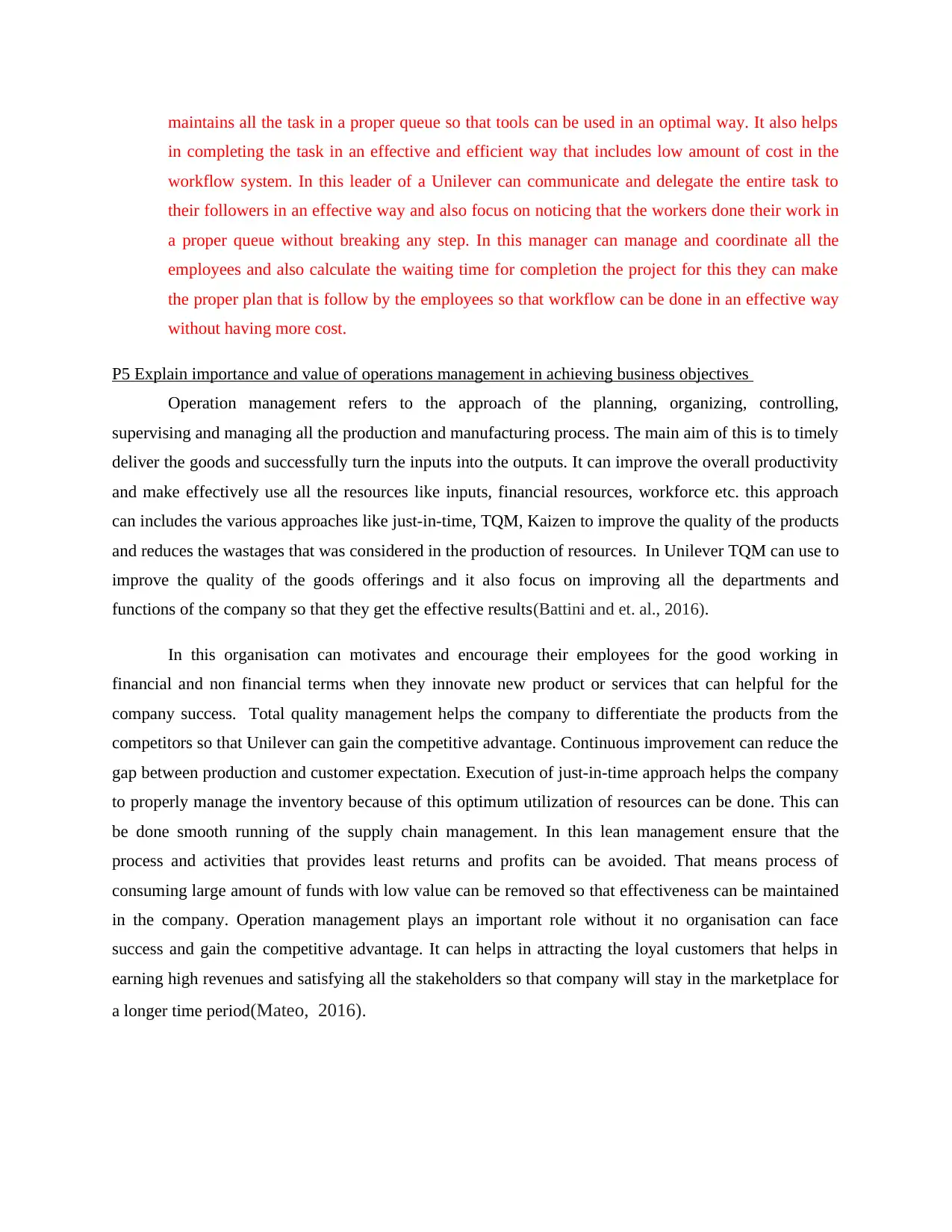
maintains all the task in a proper queue so that tools can be used in an optimal way. It also helps
in completing the task in an effective and efficient way that includes low amount of cost in the
workflow system. In this leader of a Unilever can communicate and delegate the entire task to
their followers in an effective way and also focus on noticing that the workers done their work in
a proper queue without breaking any step. In this manager can manage and coordinate all the
employees and also calculate the waiting time for completion the project for this they can make
the proper plan that is follow by the employees so that workflow can be done in an effective way
without having more cost.
P5 Explain importance and value of operations management in achieving business objectives
Operation management refers to the approach of the planning, organizing, controlling,
supervising and managing all the production and manufacturing process. The main aim of this is to timely
deliver the goods and successfully turn the inputs into the outputs. It can improve the overall productivity
and make effectively use all the resources like inputs, financial resources, workforce etc. this approach
can includes the various approaches like just-in-time, TQM, Kaizen to improve the quality of the products
and reduces the wastages that was considered in the production of resources. In Unilever TQM can use to
improve the quality of the goods offerings and it also focus on improving all the departments and
functions of the company so that they get the effective results(Battini and et. al., 2016).
In this organisation can motivates and encourage their employees for the good working in
financial and non financial terms when they innovate new product or services that can helpful for the
company success. Total quality management helps the company to differentiate the products from the
competitors so that Unilever can gain the competitive advantage. Continuous improvement can reduce the
gap between production and customer expectation. Execution of just-in-time approach helps the company
to properly manage the inventory because of this optimum utilization of resources can be done. This can
be done smooth running of the supply chain management. In this lean management ensure that the
process and activities that provides least returns and profits can be avoided. That means process of
consuming large amount of funds with low value can be removed so that effectiveness can be maintained
in the company. Operation management plays an important role without it no organisation can face
success and gain the competitive advantage. It can helps in attracting the loyal customers that helps in
earning high revenues and satisfying all the stakeholders so that company will stay in the marketplace for
a longer time period(Mateo, 2016).
in completing the task in an effective and efficient way that includes low amount of cost in the
workflow system. In this leader of a Unilever can communicate and delegate the entire task to
their followers in an effective way and also focus on noticing that the workers done their work in
a proper queue without breaking any step. In this manager can manage and coordinate all the
employees and also calculate the waiting time for completion the project for this they can make
the proper plan that is follow by the employees so that workflow can be done in an effective way
without having more cost.
P5 Explain importance and value of operations management in achieving business objectives
Operation management refers to the approach of the planning, organizing, controlling,
supervising and managing all the production and manufacturing process. The main aim of this is to timely
deliver the goods and successfully turn the inputs into the outputs. It can improve the overall productivity
and make effectively use all the resources like inputs, financial resources, workforce etc. this approach
can includes the various approaches like just-in-time, TQM, Kaizen to improve the quality of the products
and reduces the wastages that was considered in the production of resources. In Unilever TQM can use to
improve the quality of the goods offerings and it also focus on improving all the departments and
functions of the company so that they get the effective results(Battini and et. al., 2016).
In this organisation can motivates and encourage their employees for the good working in
financial and non financial terms when they innovate new product or services that can helpful for the
company success. Total quality management helps the company to differentiate the products from the
competitors so that Unilever can gain the competitive advantage. Continuous improvement can reduce the
gap between production and customer expectation. Execution of just-in-time approach helps the company
to properly manage the inventory because of this optimum utilization of resources can be done. This can
be done smooth running of the supply chain management. In this lean management ensure that the
process and activities that provides least returns and profits can be avoided. That means process of
consuming large amount of funds with low value can be removed so that effectiveness can be maintained
in the company. Operation management plays an important role without it no organisation can face
success and gain the competitive advantage. It can helps in attracting the loyal customers that helps in
earning high revenues and satisfying all the stakeholders so that company will stay in the marketplace for
a longer time period(Mateo, 2016).
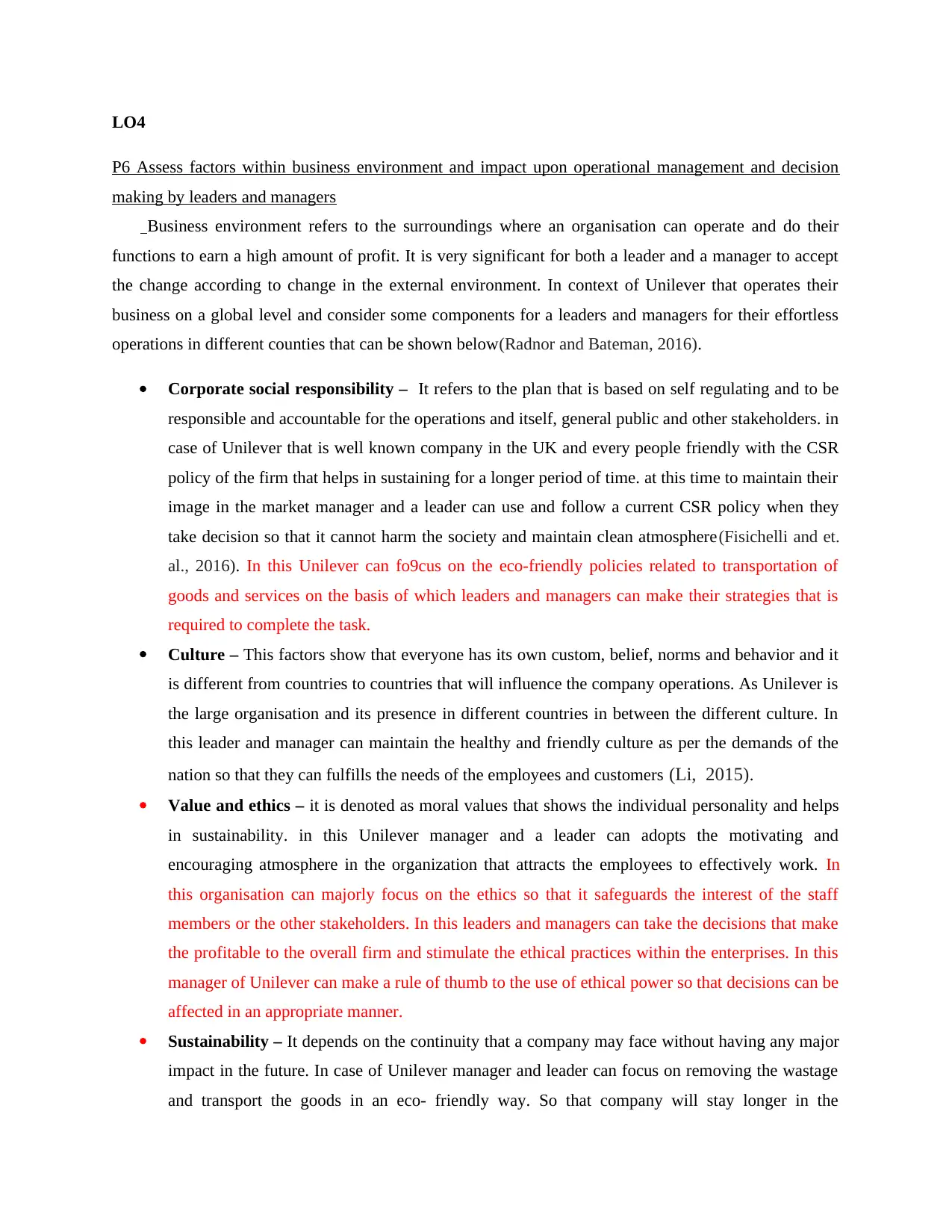
LO4
P6 Assess factors within business environment and impact upon operational management and decision
making by leaders and managers
Business environment refers to the surroundings where an organisation can operate and do their
functions to earn a high amount of profit. It is very significant for both a leader and a manager to accept
the change according to change in the external environment. In context of Unilever that operates their
business on a global level and consider some components for a leaders and managers for their effortless
operations in different counties that can be shown below(Radnor and Bateman, 2016).
Corporate social responsibility – It refers to the plan that is based on self regulating and to be
responsible and accountable for the operations and itself, general public and other stakeholders. in
case of Unilever that is well known company in the UK and every people friendly with the CSR
policy of the firm that helps in sustaining for a longer period of time. at this time to maintain their
image in the market manager and a leader can use and follow a current CSR policy when they
take decision so that it cannot harm the society and maintain clean atmosphere(Fisichelli and et.
al., 2016). In this Unilever can fo9cus on the eco-friendly policies related to transportation of
goods and services on the basis of which leaders and managers can make their strategies that is
required to complete the task.
Culture – This factors show that everyone has its own custom, belief, norms and behavior and it
is different from countries to countries that will influence the company operations. As Unilever is
the large organisation and its presence in different countries in between the different culture. In
this leader and manager can maintain the healthy and friendly culture as per the demands of the
nation so that they can fulfills the needs of the employees and customers (Li, 2015).
Value and ethics – it is denoted as moral values that shows the individual personality and helps
in sustainability. in this Unilever manager and a leader can adopts the motivating and
encouraging atmosphere in the organization that attracts the employees to effectively work. In
this organisation can majorly focus on the ethics so that it safeguards the interest of the staff
members or the other stakeholders. In this leaders and managers can take the decisions that make
the profitable to the overall firm and stimulate the ethical practices within the enterprises. In this
manager of Unilever can make a rule of thumb to the use of ethical power so that decisions can be
affected in an appropriate manner.
Sustainability – It depends on the continuity that a company may face without having any major
impact in the future. In case of Unilever manager and leader can focus on removing the wastage
and transport the goods in an eco- friendly way. So that company will stay longer in the
P6 Assess factors within business environment and impact upon operational management and decision
making by leaders and managers
Business environment refers to the surroundings where an organisation can operate and do their
functions to earn a high amount of profit. It is very significant for both a leader and a manager to accept
the change according to change in the external environment. In context of Unilever that operates their
business on a global level and consider some components for a leaders and managers for their effortless
operations in different counties that can be shown below(Radnor and Bateman, 2016).
Corporate social responsibility – It refers to the plan that is based on self regulating and to be
responsible and accountable for the operations and itself, general public and other stakeholders. in
case of Unilever that is well known company in the UK and every people friendly with the CSR
policy of the firm that helps in sustaining for a longer period of time. at this time to maintain their
image in the market manager and a leader can use and follow a current CSR policy when they
take decision so that it cannot harm the society and maintain clean atmosphere(Fisichelli and et.
al., 2016). In this Unilever can fo9cus on the eco-friendly policies related to transportation of
goods and services on the basis of which leaders and managers can make their strategies that is
required to complete the task.
Culture – This factors show that everyone has its own custom, belief, norms and behavior and it
is different from countries to countries that will influence the company operations. As Unilever is
the large organisation and its presence in different countries in between the different culture. In
this leader and manager can maintain the healthy and friendly culture as per the demands of the
nation so that they can fulfills the needs of the employees and customers (Li, 2015).
Value and ethics – it is denoted as moral values that shows the individual personality and helps
in sustainability. in this Unilever manager and a leader can adopts the motivating and
encouraging atmosphere in the organization that attracts the employees to effectively work. In
this organisation can majorly focus on the ethics so that it safeguards the interest of the staff
members or the other stakeholders. In this leaders and managers can take the decisions that make
the profitable to the overall firm and stimulate the ethical practices within the enterprises. In this
manager of Unilever can make a rule of thumb to the use of ethical power so that decisions can be
affected in an appropriate manner.
Sustainability – It depends on the continuity that a company may face without having any major
impact in the future. In case of Unilever manager and leader can focus on removing the wastage
and transport the goods in an eco- friendly way. So that company will stay longer in the
⊘ This is a preview!⊘
Do you want full access?
Subscribe today to unlock all pages.

Trusted by 1+ million students worldwide
1 out of 15
Related Documents
Your All-in-One AI-Powered Toolkit for Academic Success.
+13062052269
info@desklib.com
Available 24*7 on WhatsApp / Email
![[object Object]](/_next/static/media/star-bottom.7253800d.svg)
Unlock your academic potential
Copyright © 2020–2026 A2Z Services. All Rights Reserved. Developed and managed by ZUCOL.





